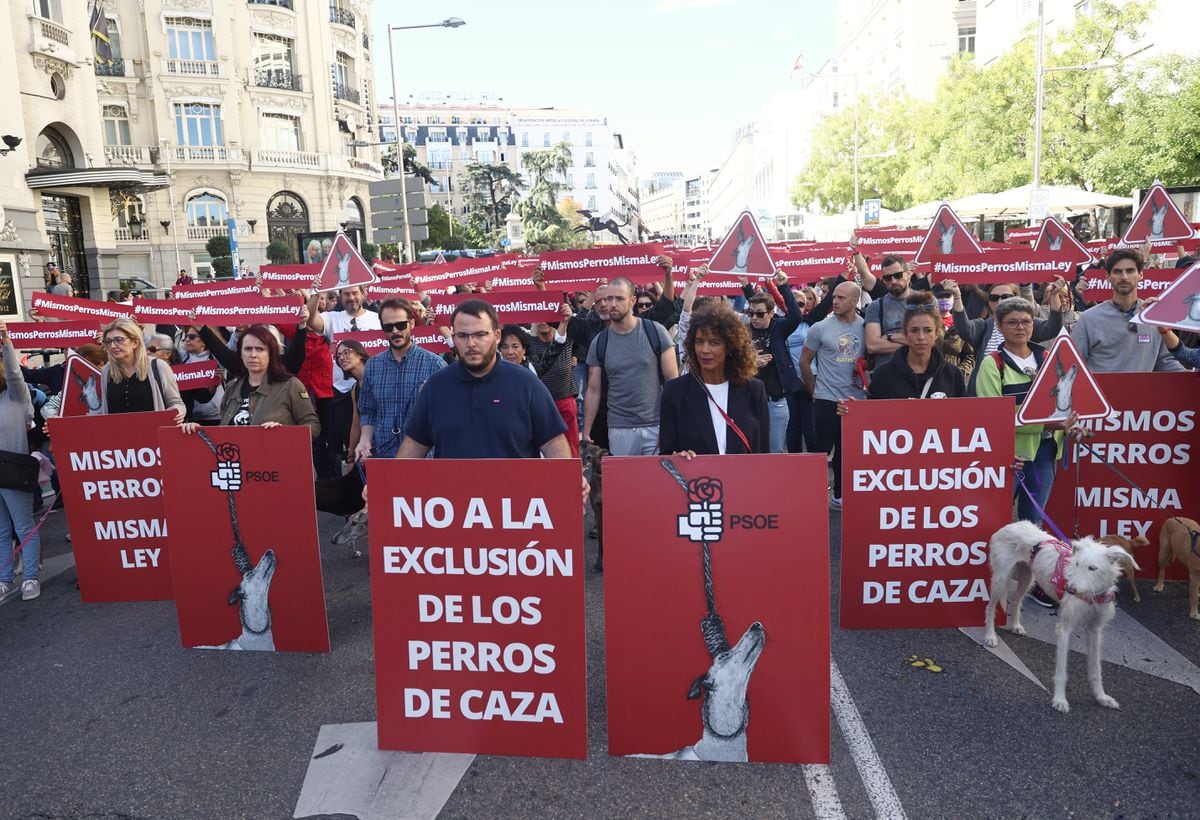Protest, last Friday, before Congress against the PSOE amendment to exclude hunting dogs from the animal protection law. Eduardo Parra (Europa Press)
As expected, Congress on Thursday overturned the amendments to the entire Law for the Protection, Rights and Welfare of Animals, presented by PP, Vox and PNV (the latter, due to a matter of competence).
Now a parliamentary procedure is starting that is far from placid: it is expected that different partial amendments will be presented that can greatly modify the text, as has already happened in the previous process.
The main one is that of the PSOE, which has proposed excluding hunting and herding dogs from the norm, something that neither Podemos nor the majority of the investiture likes.
These are the main controversies of the new legislation and the process that will follow from now on.
Hunting and herding dogs
Despite having agreed on the text with Podemos in the Council of Ministers in August, the PSOE surprised in September with an amendment that proposes excluding hunting dogs and other animals that perform specific tasks (sports, herding, rescue...), for which a different standard will be drawn up from the Ministry of Agriculture, which it controls.
The proposal has unnerved its parliamentary partners, animal activists, conservation NGOs and even the Royal Canine Society, which brings together owners of purebred dogs.
"The key will be to see if the PSOE will be able to maintain its amendment and with whom it intends to remove it," says Sergio García Torres, general director of Animal Rights.
In his opinion, the motion would completely undermine the law.
More information
Can they fine me if my dog gets pregnant?
Do I have to sterilize my cat?
Animal Welfare Bill Guide
Hunter Changes
Precisely the hunters have been the most critical group with the norm.
"It is an excuse to try to put an end to hunting activity in our country," says a spokeswoman for the Royal Spanish Hunting Federation (RFEC).
In her opinion, "this rule would make the survival of rehalas (hunting dogs), falconry and practices such as claiming partridges, pigeon decoys or waterfowl practically unfeasible, creating serious legal insecurity."
The regulation of hunting depends on the Ministry of Agriculture (PSOE), while that of animals depends on Social Rights (Podemos), hence the possible clash of powers that can be translated into changes in the text.
Compulsory sterilization of cats
When approved, the law will require the sterilization of all cats, except those that are going to be dedicated to breeding and whose owners are registered in a state registry.
The objective is that all animals are identified in order to prosecute mistreatment and reduce the very high rates of abandonment in Spain.
Sandra Guaita, deputy for the PSOE, explains that "the majority of abandoned animals are abandoned due to unwanted litters, so birth control will allow traceability as is already the case with production animals."
The hunters believe that the measure will also apply to hunting dogs, thus "preventing replacement breeding", but Social Rights deny this.
Of course, the owners of dogs that have offspring will have to register in a state registry.
feline colonies
The legislation promotes the CER method (Capture, Sterilize, Return) for the responsible management of feline colonies, and creates the figure of the caretaker of these colonies.
"Stray cats are not domestic, there are a large number, and what makes sense is population control," says Milagros Marcos, a PP deputy, a position shared by many biologists.
In fact, last year more than 800 scientists signed a letter in EL PAÍS to criticize this measure.
García Torres (Podemos) points out that this aspect has been modified to allow the relocation of felines when they pose a problem for biodiversity.
Guaita (PSOE) points out that the CER method “is the most ethical and is aimed at making street animals disappear.
It is not a method to establish feline colonies, but rather the opposite”.
Miguel Clavero, a scientist at the Doñana Biological Station and one of the signatories of that letter, points out that the law has greatly improved its processing, but considers that this aspect remains controversial: "The wording is very bizarre and relocation is considered as an exception, when feline colonies tend to have an impact on biodiversity.
In addition, it does not affect feral cats, which are a serious problem in the Canary Islands."
pet shops
"The commercialization of dogs, cats and ferrets in pet stores, as well as their display and exposure to the public for commercial purposes, is prohibited," says the current wording.
The measure aims to avoid compulsive purchases —which are the ones that generate the most dropouts—, something already in force in communities such as Madrid.
Milagros Marcos, from the PP, considers that all kinds of obstacles are placed on the stores to show the animals, while the protectors will not have these restrictions.
"The animal doesn't care if you buy it or adopt it," he adds.
García Torres (Podemos) responds that precisely in Madrid there are more pet stores than ever, but focused on food and products for pets.
The rest of the animals that are sold cannot be displayed in the shop windows.
mink farms
Previous versions of the legislation included a ban on American mink farms, something that has been dropped after negotiations with Agriculture, which considers them production animals.
“We demand the closure of these farms because they have many risks due to the escape of these animals into the natural environment, they are invasive and displace the native fauna.
Both for human health and for animal health they should not exist, ”says Laura Moreno, from the NGO WWF Spain.
Goodbye dangerous dogs
The list of eight potentially dangerous dog breeds will be removed.
Instead, there will be a sociability test for larger dogs (yet to be defined), so that those who pass the test will be able to handle themselves like the others, while those who don't (or prefer not to) will need special handling with short leash and muzzle, among other issues.
It remains to be seen how the test will be and how many dogs must pass it.
Next steps
The parliamentary procedure now continues with the exposition of the law in commission, where different experts will also participate (at their own request or at the request of the parties).
This process initially lasts two weeks, although it can be extended.
Later, the amendments of the political groups will come, which will have to negotiate to get them forward.
The normal thing is to propose these amendments at that time, that is why the PSOE one a month ago was so surprising.
Podemos believes that the Socialists will be forced to withdraw it, while the PP says that it has not yet studied it.
Finally, the entire text is voted on in Congress and passed to the Senate;
if there are no changes, it is approved, otherwise, it is voted on again in the lower house.
The General Directorate for Animal Rights trusts that the process will end before the end of the year.
Parallel,
You can follow CLIMA Y MEDIO AMBIENTE on
and
, or sign up here to receive
our weekly newsletter









